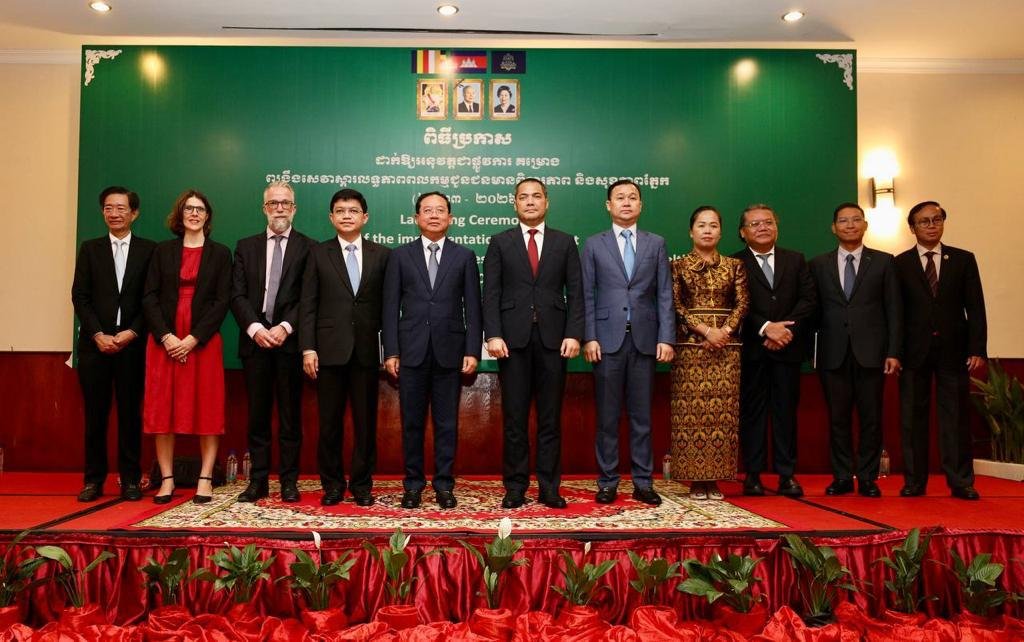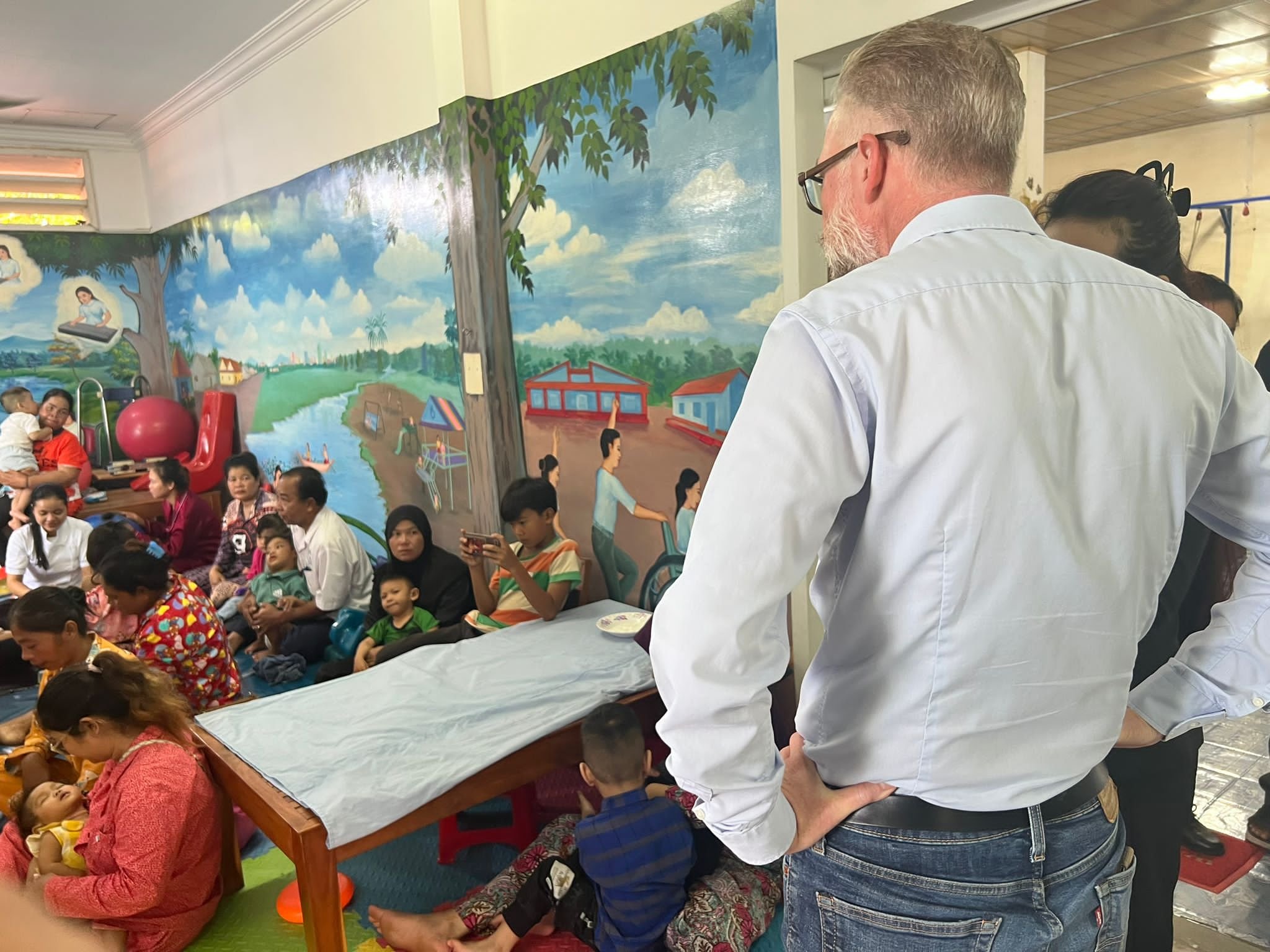Catalytic funding set to increase access to assistive technology for 275,000 Cambodians by 2025
The Government of Cambodia has launched a three-year programme that aims to reach 275,000 Cambodians with assistive technology such as prosthetics, wheelchairs and eyeglasses. Underpinned by a comprehensive national work plan, this significant step will enable people to live healthier, more productive, independent, and dignified lives and to participate in education, the labour market and their communities.
The need for assistive technology is very high in Cambodia, as noted by H.E. Professor Chheang Ra, Minister of Health, during the programme’s launch event in Phnom Penh. Cambodia has an estimated 2.2 million persons with disabilities, including over 320,000 people with significant functional impairments. This does not account for Cambodians with mild impairments, such as those who may need eyeglasses. According to the national strategic plan for blindness prevention and control 2021-2030, an estimated 0.5% of the population have uncorrected refractive error meaning about 750,000 Cambodians need eyeglasses to see properly. As the population ages, these numbers will increase greatly.
ATscale is supporting the Government of Cambodia with US$3.2 million over three years. Clinton Health Access Initiative (CHAI), Humanity & Inclusion (HI) and the Cambodia Disabled People’s Organization (CDPO) will provide programme management and technical assistance to support the implementation of interventions in the areas of enabling environments, visual impairment and physical disability under the guidance of Project Management Committee co-chaired by the Ministry of Health and Ministry of Social Affairs.
Pascal Bijleveld, ATscale CEO, meeting HE Prof Chheang Ra, Minister of Health.
Launching a sustainable and transformative programme
The launch event in Phnom Penh on Thursday 26 October 2023 took place under the joint leadership of the Minister of Health and the Minister of Social Affairs, Veterans and Youth Rehabilitation of the Government of Cambodia. It was attended by representatives of disabled persons, and senior government officials and development partners, including CHAI, HI, CDPO, WHO, UNDP, DFAT, Fred Hollows Foundation, UNICEF, ICRC, Exceed, and the association of physical therapists.
Launch event, attended by Soleine Scotney, Pascal Bijleveld, HE Prof Chheang Ra, Minister of Health, and HE Chea Somethy, Minister of Social Affairs, Veterans and Youth Rehabilitation
“Assistive technology, such as glasses, hearing aids and prosthetics enable people to live more healthy, productive, independent and dignified lives, and to participate in education, the labour market and civic life,” said H.E. Minister Chea Somethy, Minister of Social Affairs, Veterans and Youth Rehabilitation.
The programme will strengthen quality of services at public rehabilitation centres and vision centres, expand outreach to the community, and further build a skilled workforce to meet the population’s needs, among other interventions. The Government is committed to expanding access to assistive technology rapidly, while strengthening the enabling environment and promoting long-term and sustainable services.
Building on previous work supported by ATscale
The programme also builds on the momentum of previous work undertaken through a project called ‘Scaling up Refractive Error Services in Cambodia’ or ‘SURES Project Phase I’ implemented in partnership by The Fred Hollows Foundation, funded by USAID, with support from ATscale, administered by UNOPS. Over 300,000 children and adults in Cambodia have benefited from this initiative so far. The SURES project committee, service delivery guidelines, and lessons learned from vision centres under Phase I will continue to inform ATscale investments to scale up vision services, including access to eyeglasses, nation-wide.
Assistive technology will become an increasingly important part of quality of care as more and more Cambodians age, and primary health care centres will need to be more inclusive of elderly people. This means, potentially, improving basic knowledge of physiotherapy and occupational therapy among health workers, and ensuring adequate referrals for more specialist services.
“Having access to assistive technology is one of the big equity drives that will allow everyone to fill their full potential within society, and we must remember that this launch is only the beginning. When we invest in it, we create a world where care is available, accessible, and affordable regardless of circumstance and economic status.” said Soleine Scotney, Country Director of CHAI Cambodia. "Alongside our consortium partners, Humanity & Inclusion (HI) and the Cambodian Disabled People's Organization (CDPO), CHAI is proud to support the Royal Government of Cambodia to deliver on this crucial mandate.”
Soleine Scotney, Country Director of CHAI Cambodia, speaking at the launch event.
“ATscale is a young initiative, and Cambodia is one of the first countries we have partnered with. I was in Cambodia a year and a half ago for some initial discussions, and it is wonderful to see how things have progressed since. I feel very hopeful about the growing momentum,” said Pascal Bijleveld, ATscale CEO.
Pascal Bijleveld, ATscale CEO, speaking at the launch event.
As part of his trip to Cambodia for the launch event, Pascal visited a Physical Rehabilitation Centre, supported by the Government of Cambodia and Humanity & Inclusion, that provides prosthetics and orthotics to children and adults with mobility impairments. He also visited a Vision Centre established by the Government of Cambodia under the National Program for Eye Health, implemented by The Fred Hollows Foundation Cambodia under the SURES I phase supported and managed by USAID and ATscale.
Visiting a Vision Centre, established by the Government of Cambodia under the National Program for Eye Health, with implementation from FHF Cambodia under the SURES I phase, supported and managed by USAID and ATscale.
Visiting a Physical Rehabilitation Centre, supported by the Government of Cambodia and Humanity & Inclusion.






